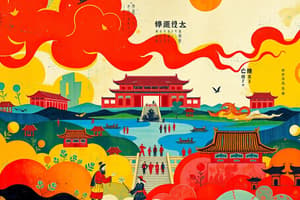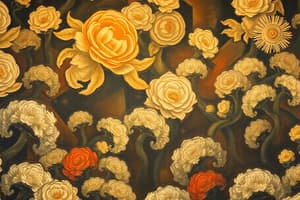Podcast
Questions and Answers
Who is credited with discovering the new sea route to India and the Far East in 1498?
Who is credited with discovering the new sea route to India and the Far East in 1498?
- Amerigo Vespucci
- Christopher Columbus
- Ferdinand Magellan
- Vasco de Gama (correct)
What did Amerigo Vespucci realize about the land he discovered?
What did Amerigo Vespucci realize about the land he discovered?
- It was an island
- It was India
- It was a new continent (correct)
- It was part of Africa
Where did Ferdinand Magellan name 'Strait of Magellan'?
Where did Ferdinand Magellan name 'Strait of Magellan'?
- Northern tip of America
- Southern tip of Africa
- Southern tip of South America (correct)
- Eastern tip of Asia
Which explorer sailed along the coast of South America before reaching the Philippines?
Which explorer sailed along the coast of South America before reaching the Philippines?
Who proved that the Earth is round during their exploration?
Who proved that the Earth is round during their exploration?
What does losing the 'mandate of heaven' mean in the context of Chinese dynastic cycle?
What does losing the 'mandate of heaven' mean in the context of Chinese dynastic cycle?
What distinguished capitalism from previous economic systems according to the text?
What distinguished capitalism from previous economic systems according to the text?
What factor encouraged European exploration and discoveries in the 15th and 16th centuries?
What factor encouraged European exploration and discoveries in the 15th and 16th centuries?
Which European explorer sailed along the western coast of Africa and named the southern tip 'Cape of Good Hope'?
Which European explorer sailed along the western coast of Africa and named the southern tip 'Cape of Good Hope'?
What new invention aided European exploration in the 15th and 16th centuries?
What new invention aided European exploration in the 15th and 16th centuries?
Flashcards are hidden until you start studying
Study Notes
Dynastic Cycle in China
- The Chinese believed in a dynastic cycle, where a new dynasty would rise to power, become corrupt and weak, lose the people's support, and eventually be replaced by another dynasty.
- The cycle repeated throughout Chinese history, with each new dynasty claiming the 'Mandate of Heaven' (authority and legitimacy to rule).
- The Qin to Qing dynasties ruled China, until the Qing dynasty was overthrown by a revolution in 1911-1912.
Development of Early Capitalism
- Early capitalism developed in Europe, distinguished by the use of accumulated capital to enlarge productive capacity.
- Merchants learned to buy raw materials, manufacture products, and sell finished goods.
- Long-distance trade became important, but faced problems like transportation difficulties, war, robbery, and heavy taxes.
- The development of early capitalism was encouraged by historical events, such as the revival of trade in ancient cities and towns in Europe.
The Age of Exploration and Discoveries
- The Age of Exploration and Discoveries occurred in the 15th and 16th centuries, driven by European interest in long-distance trade and luxury goods from the Far East.
- New inventions like the compass, quadrant, and astrolabe, as well as better maps and sailing ships, facilitated exploration.
- Prince Henry the Navigator of Portugal and Queen Isabella of Spain sponsored voyages, inspired by economical, religious, and glorious motivations.
- Spain and Portugal led the exploration and discoveries in the 15th and 16th centuries, followed by Holland, Britain, France, and Russia.
Notable Explorers
- Bartholomew Diaz sailed around the southern tip of Africa, naming it the 'Cape of Storms' and later the 'Cape of Good Hope'.
- Christopher Columbus believed he could reach the Far East quickly by sailing west across the Atlantic Ocean, sponsored by Queen Isabella.
- Vasco da Gama discovered a new sea route to India and the Far East in 1498.
- Ferdinand Magellan circumnavigated the world between 1519-1522, sailing along the coast of South America, naming the 'Strait of Magellan' and the 'Pacific Ocean'.
Studying That Suits You
Use AI to generate personalized quizzes and flashcards to suit your learning preferences.




